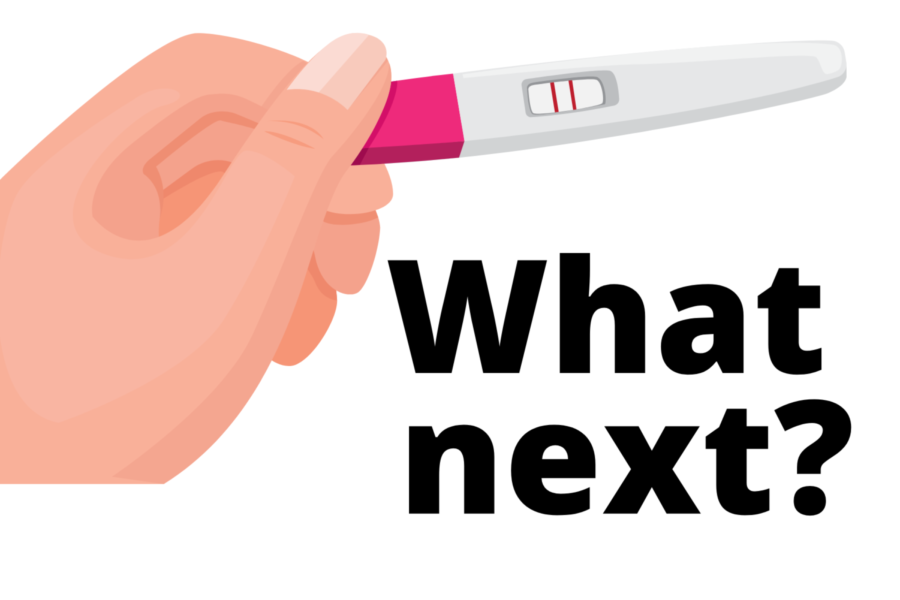A student’s journey through unplanned pregnancy
According to the World Health Organization, 4.7 to 13.2% of maternal deaths are attributed to unsafe abortions, or approximately 220 deaths per 100,000. According to Business Insider, 12 of the 13 states with trigger laws would allow abortions to be performed if the mother’s life was at risk, with Oklahoma being the only exception by not allowing abortion for any reason, even if the mother is in danger.
Due to the sensitive nature of this story, this student requested anonymity so names have been changed to respect her privacy.
Amelia Miller’s abortion was February 17.
A young woman too scared to buy her own pregnancy test. Just when she thought this could never happen to her, at 19 years old, two lines appeared on her test. Positive.
Miller is just like any other student at Missouri Southern. She goes to class. She hangs out with friends. She worries about her future.
Miller and her first boyfriend lost their virginity together when she was 16 years old, just one year below the national average for girls.
“We used protection for a long time, then we slowly stopped using it,” Miller said.
She started taking birth control pills when she was 17. Like many women, she wasn’t consistent.
“I didn’t like using condoms as much and I knew I wasn’t consistent enough with my pill to rely on it,” Miller said. “So, I would use Plan B as extra protection because I didn’t want to have kids.”
Plan B, also called the morning-after pill, is emergency contraception that prevents the release of an egg to avoid fertilization. It can be taken up to 72 hours after intercourse but is recommended to be taken as soon as possible to increase effectiveness.
Inevitably, Miller and her first boyfriend broke up. After a while she began to casually date. Then 18 months later she began dating Daniel, who she has been with for just over a year and a half.
After several months, Miller and Daniel had sex for the first time. While it wasn’t Miller’s first time, it was Daniel’s. Miller was already comfortable with sex and she felt she had a good understanding of when she was at risk of pregnancy.
“We just went for it,” Miller said.
In Missouri, each school district has discretion regarding sex education. The curriculum ranges from comprehensive sex education to abstinence only, which is what is preferred per state law. However, a study by the University of Washington revealed 60% fewer teenagers who received comprehensive sex education reported lower pregnancy rates compared to their abstinence only educated peers.
According to the Sexuality Information and Education Council of the United States, in 2018 the United States spent over $ 2.1 billion dollars on abstinence only education.
Miller and Daniel relied more on Plan B, however, after a year Miller became concerned about her reproductive health.
“I felt like it [Plan B] was messing me up and I wasn’t convinced I was even fertile,” Miller said. “I stopped taking it to try and preserve my reproductive system.”
Planned Parenthood states that emergency contraception, or Plan B, does not damage a woman’s reproductive system. According to the Mayo Clinic, blood clotting, vomiting and nausea are rare side effects of taking a high dosage of progestin, the active ingredient in Plan B and birth control.
According to Healthline, only 54% of high school students report using condoms. For Miller and Daniel, using protection was a mutual concern.
“We discussed it a lot actually, and even bought a very large package of condoms,” Miller said. “But when in the moment, we wouldn’t take the time to get them.”
The night of December 27 was an average night for the couple. They grabbed dinner and returned to the house to watch a movie. As the night went on, condoms did cross their minds.
“Once again, we decided that we were already there so we didn’t want to go get them,” Miller said.
Life went on.
Miller is just like any other student. Except on January 25, unemployed and unprepared, she found out she was pregnant.
“I didn’t know what I was going to do,” Miller said. “I didn’t really have a plan at all.”
According to the CDC, over 2 million women, aged 18 to 24, get pregnant each year.
While trying to wrap her head around the fact that this had happened to her, she also had to figure out how to tell her parents she was pregnant.
“I never really considered abortion as an option for me, but it did cross my mind for Daniel because he is younger than me,” Miller said.
The hours after finding out were inexplicable for Miller.
“I shit myself. I thought ‘what am I going to do? How am I going to handle a baby?’”
According to Miller, initially Daniel didn’t consider keeping the baby as an option, even begging her to find a way to abort it.
However, that was not Miller’s plan.
“It made me very mad at him because I felt like he wouldn’t be there if I decided to keep it,” Miller said.
She wanted to be a team when they told their parents. So they took a week, formulated a plan, and decided to tell his parents first.
“They immediately started flipping shit. They wanted me to abort it, and pushed really, really hard,” Miller said. “His mom wouldn’t leave me alone and would text me, begging to talk to me more before I even told my family.”
Miller was mad, even more confused and felt alone and betrayed by her boyfriend. Instead of telling her family with Daniel by her side, like they had planned, she was alone when she broke the news to her mother.
Miller never expected her mother’s reaction.
Like many people from the Joplin area, Miller was brought up in a Christian household.
In Missouri, 77% of adults identified as Christian during a telephone interview conducted in 2014 by Pew Research, which is above the national average for adults in the U.S. In addition, according to the website, Only in Your State, Joplin was number 8 on the list of most religious towns in Missouri.
Miller’s mother also wanted her to abort the baby. Feeling frustrated, alone and unsupported, Miller made her final decision.
“[I decided] just to abort it, because I was tired of fighting everyone,” Miller said. “I didn’t feel like I would have the support if I did keep it.”
After making up her mind, Miller traveled to Overland Park, Kansas to have her abortion performed.
According to Kansas state law, a woman seeking an abortion must have an ultrasound performed as well as hear the heartbeat. The woman must be given the option to see the ultrasound. The law also requires the patient to be informed of each step of the process prior to performing the abortion.
“They told me it was healthy,” Miller said.
That statement stuck with Miller.
“The whole experience was traumatizing,” Miller said. “I’m not sure that I even want to have a child again anymore.”
Abortion is a controversial topic in America. States such as Texas are making attempts to ban abortion, which has been legal in the United States since the Roe v. Wade case of 1973.
According to the Guttmacher Institute, if Roe v. Wade is overturned, 26 states already have legislation in place to restrict access to abortion, or ban it. Of the 13 states with trigger laws in place, only one state could present documentation as to how it would enforce the law.
In 2019 Missouri passed a law stating that it will ban abortion if Roe v. Wade is overturned. The state is also in the process of passing legislation similar to Texas’ “Sue thy neighbor” law, in which private citizens can turn people in to authorities for traveling out of state for an abortion.
Missouri has only one abortion clinic, which is in St. Louis. A clinic in Illinois, across the Mississippi River from St. Louis, reported that from September 2021 to February 2022 75% of the abortions performed were on people who traveled from Missouri.
According to the World Health Organization, 4.7 to 13.2% of maternal deaths are attributed to unsafe abortions, or approximately 220 deaths per 100,000. According to Business Insider, 12 of the 13 states with trigger laws would allow abortions to be performed if the mother’s life was at risk, with Oklahoma being the only exception by not allowing abortion for any reason, even if the mother is in danger.
“It’s important that if you are going to have sex, you know what your plan is if you become pregnant,” Miller said. “Because you genuinely don’t know what’s going to happen, so be prepared for the worst because it can happen to you, too.”
Your donation will support the student journalists of Missouri Southern State University. Your contribution will allow us to purchase equipment and cover our annual website hosting costs.


























